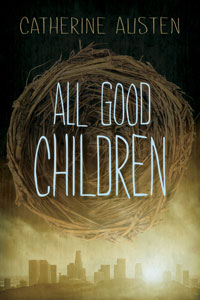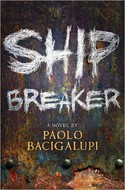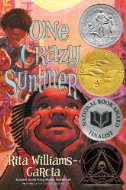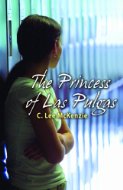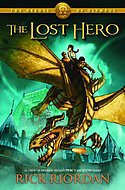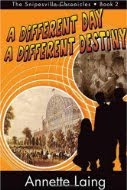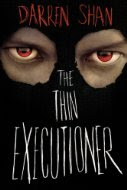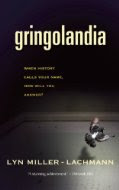 Hartley, A.J. Darwen Arkwright and the Peregrine Pact. New York: Razorbill - Penguin Group (USA) Inc., 2011. Print.
Hartley, A.J. Darwen Arkwright and the Peregrine Pact. New York: Razorbill - Penguin Group (USA) Inc., 2011. Print.[Book cover credit: librarything.com/work/11243909]
Booktalk:
Darwen stood up and turned. Behind him the forest continued, but -- suspended in midair, exactly at the height he had hung it on the back of the door -- was the empty mirror frame, and through it he could see the shelves and coat hangers in his bedroom closet. For a moment, all the strangeness fell away and a single word came to mind.When Darwen gets to Atlanta he's far from home with no friends, a business-minded aunt, and the specter of a
"Cool," he said into the night.
p.45-46*
Review:
Darwen immediately falls in love with the world through his mirror (as did I). It's lush and quiet and exciting, and he almost immediately makes a new friend. In short, it's nothing like Atlanta, where the weather's hot but the tea is only lukewarm, which is nothing like the small town near Manchester that Darwen used to call home. As things start to go badly in Silbrica (mirror world) and Darwen and his new friends become more involved in finding a solution, the more we find out about Darwen's past and how he ended up in Georgia. He is so very sad and doesn't want to let anyone in. I thought that his issues were just going to be left unresolved once the action in Silbrica got going, but I was happily surprised to see that Silbrica and the "real world" were much more connected than I could have imagined in that and other respects.
Darwen briefly mentions that he has one Black parent and one white, something that, in the past, made him feel like he never belonged in either group. This is not, however, an issue for him at his new school in Atlanta (his newness and lack of familiarity with American football provide more than enough fodder for the bullies). In this prestigious school for which tuition must be paid in advance, class is a much bigger divider than race. In this respect, Darwen should be good -- his aunt is a successful businesswoman, after all -- but his blue-collar Manchester accent (as opposed to a posh one from London) gets in his way. On the other hand, Darwen's friend Alexandra is avoided by everyone because she is just so annoying (so so annoying), and yet approved of by Darwen's aunt (who also finds her exhausting) because of Alexandra's mother's success and refinement. His friend Rich, who is super smart, kind, and polite, is looked down upon by classmates and Darwen's aunt alike because of his family's "white trash" farming background. All three of them feel their outsider status acutely, which is part of why they end up becoming friends even though they have little in common.
All of these real life concerns pale, both in Darwen's mind and in the reading, in comparison to Mr. Peregrine and his mirror shop of gateways to Silbrica. Though the beauty and the magic of the place does not last long for Darwen, he sees enough of it to know that the world on the other side of the mirror is special, that it is a place worth saving, and that he is a part of it. The more horrible the situation gets there and the more horrible the creatures Darwen et. al. encounter, the stronger his determination to save it (and the stronger the intensity of the story) becomes.
This is a really fun, adventurous read. Though it is a bit darker, I think it fits well with other secret-world-in-the-wardrobe-type books, and it will be a good book for readers ready to graduate from those books but not yet ready for the content in older YA fantasies.
I'll leave you with one last quote to seal the deal:
"... Well, this is excellent."
"Excellent?" Darwen repeated. "I almost got killed!"
"Almost is such a wonderful word, don't you think?" said the shopkeeper with a wink. "So full of wiggle room and loopholes, so not-absolutely-anything. Almost killed means still very much alive, which, I'm sure you will agree, makes all the difference. So, the only remaining question is, when are you going back?"
p.145-6*
Darwen Arkwright and the Peregrine Pact comes out next week!
Book source: ARC provided by the publisher through the LibraryThing Early Reviewers program.
*Quotes and page numbers are from an uncorrected proof and may not match the published copy.
Links to Amazon.com may be affiliate links for the Amazon Associates program. If you buy something through this link, I may receive a referral fee.
